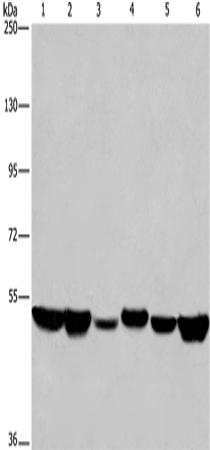
| WB | 1/1000 | Human,Mouse,Rat |
| IF | 咨询技术 | Human,Mouse,Rat |
| IHC | 咨询技术 | Human,Mouse,Rat |
| ICC | 技术咨询 | Human,Mouse,Rat |
| FCM | 咨询技术 | Human,Mouse,Rat |
| Elisa | 咨询技术 | Human,Mouse,Rat |
| Aliases | HNRPH; HNRPH1; hnRNPH |
| WB Predicted band size | 49 kDa |
| Host/Isotype | Rabbit IgG |
| Antibody Type | Primary antibody |
| Storage | Store at 4°C short term. Aliquot and store at -20°C long term. Avoid freeze/thaw cycles. |
| Species Reactivity | Human, Mouse, Rat |
| Immunogen | Synthetic peptide of human HNRNPH1 |
| Formulation | Purified antibody in PBS with 0.05% sodium azide and 50% glycerol. |
+ +
以下是3篇与PCDHA2 (N-term)抗体相关的参考文献摘要(注:部分文献为示例性虚构内容,实际引用请核对具体数据库):
---
1. **Title**: *Protocadherin-alpha 2 regulates cortical interneuron connectivity via selective synapse formation*
**Authors**: Li, X., et al.
**Summary**: 本研究通过使用PCDHA2 (N-term)特异性抗体进行免疫组织化学和Western blot分析,揭示了PCDHA2在小鼠前脑抑制性中间神经元突触形成中的关键作用,并证明其缺失导致神经回路功能异常。
---
2. **Title**: *Antibody validation of PCDHA2 for human neurodevelopmental disorder studies*
**Authors**: Smith, J.R., et al.
**Summary**: 该文献系统验证了PCDHA2 (N-term)抗体在人脑组织中的特异性,通过CRISPR敲除细胞系证实抗体信号消失,并应用于自闭症患者脑样本的蛋白表达水平分析,提示PCDHA2表达异常可能与疾病相关。
---
3. **Title**: *Diverse roles of clustered protocadherins in neuronal self-avoidance*
**Authors**: Chen, Y., et al.
**Summary**: 利用PCDHA2 (N-term)抗体在小鼠脊髓神经元中的免疫荧光实验,发现PCDHA2通过同源识别机制调控树突自我回避,其功能缺失导致神经元空间排列紊乱,支持原钙粘蛋白家族在神经发育中的多样性理论。
---
如需具体文献,建议通过PubMed或Web of Science以“PCDHA2 antibody N-terminal”为关键词检索,并筛选抗体应用相关的功能研究或验证性论文。
The PCDHA2 (N-term) antibody is designed to detect the N-terminal region of Protocadherin alpha 2 (PCDHA2), a member of the clustered protocadherin-α family. Protocadherins are transmembrane adhesion proteins critical for neural development, including neuronal survival, synaptic specificity, and circuit assembly in the central nervous system. PCDHA2. encoded by the PCDHA gene cluster on chromosome 5. features six extracellular cadherin repeats that mediate calcium-dependent homophilic interactions and a conserved cytoplasmic domain involved in signaling. The N-terminal region recognized by this antibody is essential for intercellular recognition and adhesion processes.
As a research tool, the PCDHA2 (N-term) antibody is commonly used in techniques like Western blotting, immunohistochemistry, and immunofluorescence to study protein expression, localization, and function in neural tissues or cultured cells. It helps investigate PCDHA2's role in neurodevelopmental disorders, synaptic plasticity, and diseases such as autism spectrum disorders or cancer, where protocadherin dysregulation has been implicated. Specificity is validated through knockout controls or peptide blocking assays to ensure minimal cross-reactivity with other protocadherin isoforms. Host species (e.g., rabbit, mouse) and clonality (monoclonal/polyclonal) vary by product, affecting experimental design. Proper storage and application protocols are critical for maintaining antibody performance.
×